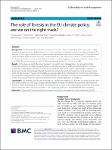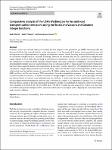Tìm kiếm
Tác giả
- Alola, Andrew Adewale (1)
- Korosuo, Anu (1)
- Mersin, Kadir (1)
- Pilli, Roberto (1)
- Sau >
Chủ đề
Năm xuất bản
- 2023 (2)
Toàn văn
- true (2)
Kết quả tìm kiếm
The European Union (EU) has committed to achieve climate neutrality by 2050. This requires a rapid reduction of greenhouse gas (GHG) emissions and ensuring that any remaining emissions are balanced through CO2 removals. Forests play a crucial role in this plan: they are currently the main option for removing CO2 from the atmosphere and additionally, wood use can store carbon durably and help reduce fossil emissions. To stop and reverse the decline of the forest carbon sink, the EU has recently revised the regulation on land use, land-use change and forestry (LULUCF), and set a target of − 310 Mt CO2e net removals for the LULUCF sector in 2030. |
Countries’ sectors are currently under great scrutiny for their response to the greenhouse gas (GHG) emission profile and the general effect of the sectoral activities on the environment. As in the agenda of all sectors, environmental concerns and investigations are of high importance in shipping and maritime transport. Amidst the rising forms of globalization, the need for sustainable transportation is constantly increasing. However, the machines that are the cornerstone of transportation largely depend on fossil fuels, thus resulting in environmental degradation. Notably, environmental-related degradation has continued to account for global warming, climate change, and ocean acidification. Shipping is considered the most environmentally friendly mode of transportation in terms of ... |


